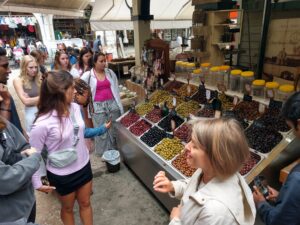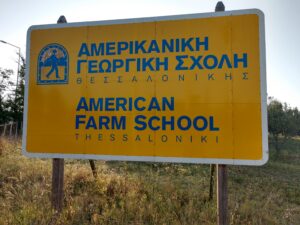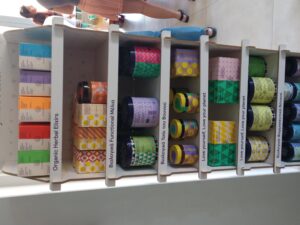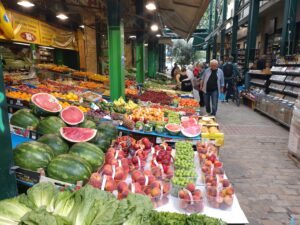SEE Inside Greek Ag: International Opportunity for Exploring Extension and Career Development
go.ncsu.edu/readext?1030747
en Español / em Português
El inglés es el idioma de control de esta página. En la medida en que haya algún conflicto entre la traducción al inglés y la traducción, el inglés prevalece.
Al hacer clic en el enlace de traducción se activa un servicio de traducción gratuito para convertir la página al español. Al igual que con cualquier traducción por Internet, la conversión no es sensible al contexto y puede que no traduzca el texto en su significado original. NC State Extension no garantiza la exactitud del texto traducido. Por favor, tenga en cuenta que algunas aplicaciones y/o servicios pueden no funcionar como se espera cuando se traducen.
Português
Inglês é o idioma de controle desta página. Na medida que haja algum conflito entre o texto original em Inglês e a tradução, o Inglês prevalece.
Ao clicar no link de tradução, um serviço gratuito de tradução será ativado para converter a página para o Português. Como em qualquer tradução pela internet, a conversão não é sensivel ao contexto e pode não ocorrer a tradução para o significado orginal. O serviço de Extensão da Carolina do Norte (NC State Extension) não garante a exatidão do texto traduzido. Por favor, observe que algumas funções ou serviços podem não funcionar como esperado após a tradução.
English
English is the controlling language of this page. To the extent there is any conflict between the English text and the translation, English controls.
Clicking on the translation link activates a free translation service to convert the page to Spanish. As with any Internet translation, the conversion is not context-sensitive and may not translate the text to its original meaning. NC State Extension does not guarantee the accuracy of the translated text. Please note that some applications and/or services may not function as expected when translated.
Collapse ▲Earlier this year, the Agricultural and Human Sciences (AHS) Department took a group of 24 students and faculty members to Greece to explore Extension and Agricultural Science from an international perspective. Science, Education, & Extension (SEE) Inside Greek Agriculture offered students an inside look to all aspects of Greek food, including livestock and crop farms, production and processing facilities, and Mediterranean dining and cuisine. The two and a half-week trip also gave students opportunities to explore agricultural education, extension, and history across different regions of Greece.
As an SEE Inside Greek Agriculture attendee, Libby Blosser, an AHS Grad Student, was able to further her understanding of the US Cooperative Extension Service and the US relation to food across the globe. Reflecting on her time in Greece, Blosser says “I believe we in America do a wonderful job of delivering research-based solutions to our farmers and producers across the country. Greece is still developing as an independent country, so they are not as advanced in their federal dispersal of Agricultural information. However, it seems the Greek people are notably focused on the quality of their food, rather than quantity or profit.”

Students learned about the history and culture of olive production in Greece on the ‘Walking Food Tour.’
While in Greece, Blosser also noticed that the Greek people have a deep connection to Agriculture as not just a means of putting food on the table, but a way of cultivating life. There was rarely a day on the trip that she didn’t notice the smiles and passion of those who were involved in Agricultural production, from dairy farmers, to lavender producers, to olive grove owners.
“You could just hear it in their voice and see it in their eyes. They are truly passionate about what they do. I hope that as our Extension service continues to improve relationships and foster community, we can also retain that deep passion and agricultural heritage that keeps us wanting to improve our food systems here in America.”
During this experience, students also looked at localized food production and processing. Many of the Greek enterprises produced their own value-added products, rather than moving it down the “assembly line” as much of our mass-produced products are done in America. “It was cool to see how even the large enterprises tried to produce everything on site or minimize the products they had to import to create a final product.” While in Greece, Blosser observed the production of pistachio products, where lemons were grown on the production facility property to make flavored pistachios; baking was also done on site to produce Pistachio baked goods. Students also visited dairy producers who raised sheep and goats on the mountainside, and then made and aged their own cheeses, and transported them to the local market in Thessoliniki to be sold.
“I’ve seen this being done more recently for some smaller-scale operations in America, but I think we could improve our local food systems if we build this localized production method to expand to more smaller and larger corporations as well,” says Blosser.
One of the the enterprises that SEE Inside Greek Agriculture students visited stood out to Blosser more than all the others: Symbeeosis, an herbal mountain tea and honey company whose goal is to contribute to fully regenerative economy, business, agriculture and beekeeping, while sharing the bounty of Nature. They believe that what is taken from nature, should also be returned.
“I think Symbeeosis’ commitment to sustainability impressed me the most. They also have an impressive market and do a great job of tailoring their products to their target audience. I think their model of working with nature, not against it, should be followed in more businesses in America and across the world. I commend this company for the good work they are doing and their dedication to sustainability.”

Vineyard at the American Farm School in Thessoliniki, GR.
Students who attended the study abroad trip were able to immerse themselves in Greek Agriculture and food, while also taking away concepts they can apply here in America. Blosser describes some of her key takeaways below:
- Food is an experience and a way of bringing people together– Take time to enjoy meals with friends and family.
- Food is Medicine. It nourishes our bodies and is truly reviving. In a highly processed American food system, we should refocus on nutritional, whole foods that fuel our bodies and minds.
- To whom much is given, much is required. As agriculturalists, we have the responsibility of feeding America. That is no small task, but if we take care of our earth and replenish it as we benefit from it, we can create a sustainable and thriving food system.
More responses from students can be found below:
“My study abroad trip to Greece was amazing! I learned so much about global agriculture and extension while exploring the beautiful landscape and meeting local Greek farmers. It was such a great experience, and I would recommend it to anyone in an Agriculture or Nutrition-related major!” –Isabel Tawagon, Ag Ed Senior
“It was a great opportunity to learn about the extension in Greece and observe the production processes of different agricultural products” –Saifur Rahman, Agricultural and Extension Education Doctoral Student
If you’d like to read more about this program, here is another article on the SEE Inside Greek Agriculture experience!





